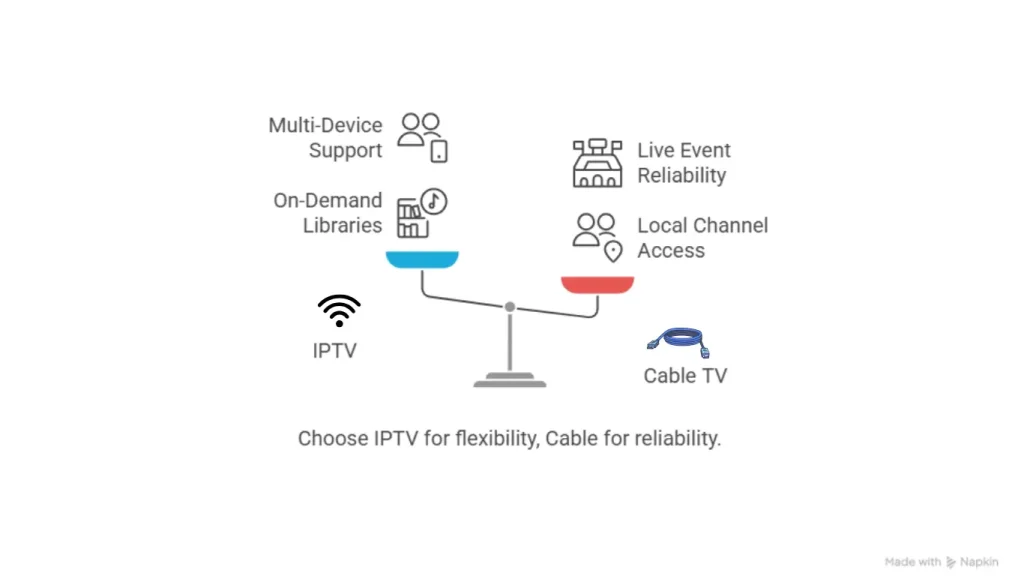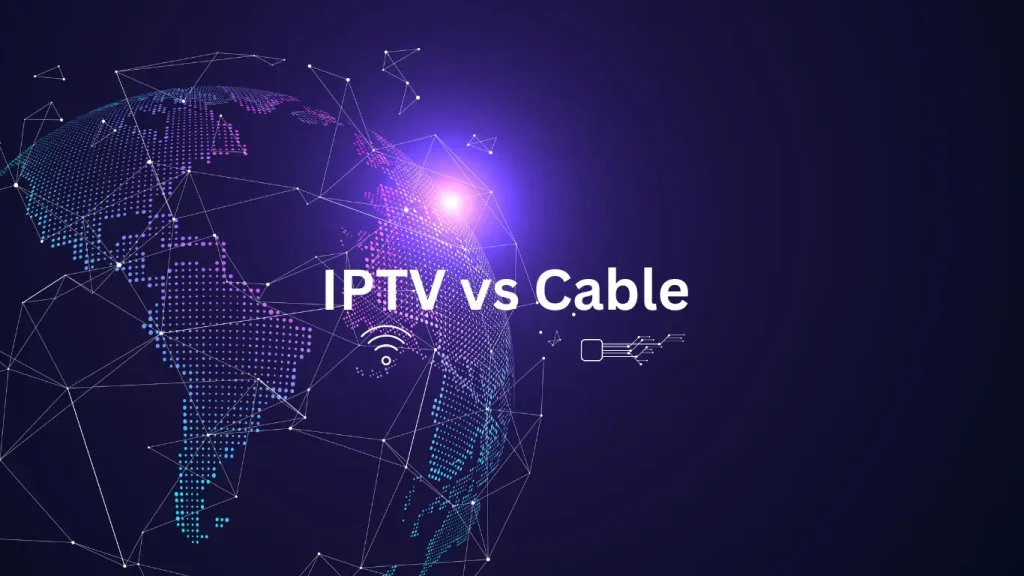Are you still watching TV through cable or satellite? If you’re looking for a better, more flexible way, IPTV might be exactly what you need.
Imagine you’re sitting on a train, deeply into the latest episode of your favorite TV series — all streaming smoothly on your laptop without any giant cable boxes. That’s why people are choosing IPTV over cable TV today.
But is IPTV really better than cable in the USA? Whether you are at home or traveling, IPTV allows you to access TV shows, movies, and live channels. In this article, I will explain it to you in simple words so you can fully understand the differences, costs, and what it’s like using IPTV daily based on my experience on the move, and help you figure out the best option for your entertainment needs.
Table of Contents
-
IPTV vs Cable TV
-
Content and Features
-
Reliability and Streaming Quality
-
My Real-Life Experience: Streaming While Traveling
-
Choosing the Right IPTV Subscription
-
Conclusion: Should You Switch?
Understanding the Basics
What is IPTV?
IPTV stands for Internet Protocol Television. Instead of using satellite signals or cables, IPTV streams shows and movies directly through your internet connection, and it has been exploding in popularity across the USA.
When you use IPTV, you’re not tied to a living room setup. You can watch on your TV, laptop, phone, or tablet. Everything feels faster, easier, and more flexible.
Cable television, the old standard, delivers content through coaxial cables linked to your home, while IPTV converts content into data packets transmitted via IP networks, making it more flexible
Technical Setup: The Real Difference
How IPTV Works
IPTV compresses video into data packets (using formats like MPEG-4) and streams it over the internet. You watch content through apps, smart TVs, or small set-top boxes connected to your WiFi .
This setup gives you tons of benefits:
-
Watch live TV
-
Access huge libraries of on-demand shows
-
Use Cloud DVR without extra hardware
Personal Note: I often stream shows while traveling by train using just my laptop and mobile . No cables, no stress.
How Cable Works
Cable TV sends pre-set TV channels over dedicated wires. You usually need a rented box and often a technician visit to set things up.
There’s not much flexibility if you want to switch shows or devices on the go
Why More Americans Prefer IPTV
People want flexibility, better pricing, and control over what they watch. IPTV offers a tailored experience, letting users pick exactly what content they want without paying for unwanted channels.
According to Statista, the pay TV penetration rate in the U.S. dropped from 88% in 2010 to just 64% by 2023, showing a major shift in how Americans consume entertainment.
Main reasons Americans are switching:
-
Save money monthly.
-
Stream on multiple devices.
-
Access exclusive international channels.
-
Watch favorite shows on-demand.
In fact, a 2023 Statista report also revealed that 27% of Americans and Canadians were planning to cut the cord within six months, further proving the growing demand for flexible streaming options like IPTV.
If you’re ready to experience the freedom IPTV offers, check out Stella IPTV for a reliable IPTV subscription designed for US viewers.
IPTV vs Cable TV
|
Feature |
IPTV |
Cable TV |
|
Contracts |
No contracts |
1-2 year contracts typical |
|
Equipment |
Minimal (app or small box) |
Cable box and extra fees |
|
Installation Fees |
None |
$50-$200 |
|
Flexibility |
Very high |
Limited to home connection |
IPTV usually saves you money per month compared to cable.
Content and Features

IPTV Offers
-
Live TV streaming (local, national, international channels)
-
Massive On-Demand libraries
-
Pause, rewind, record live TV (with Cloud DVR)
-
Multi-device support (Smart TVs, phones, tablets, laptops)
Because IPTV runs over internet protocols, updates and new channels happen much faster.
Cable TV Offers
-
Good access to local channels and sports networks
-
Strong reliability for live events
-
Limited On-Demand content compared to IPTV
-
Expensive premium channel packages
If you love being mobile and streaming across multiple devices, IPTV is the better choice for you.
Flexibility and Freedom
One huge reason I switched to IPTV was mobility.
-
With IPTV, I can start watching at home and continue on my phone while traveling.
-
Cable could never do that easily.
Most IPTV subscriptions also let you watch internationally, which is perfect if you travel a lot or split time between states
Reliability and Streaming Quality
IPTV
-
Needs a solid internet connection.
-
20 Mbps minimum for smooth HD; 50+ Mbps for 4K.
-
During my train trips, my mobile hotspot works great, but I always check coverage first.
-
Can buffer during heavy traffic if WiFi isn’t strong
Cable
-
Runs independently from your home internet.
-
Great for live shows and sports, without needing to worry about buffering.
If your internet is strong, I recommend IPTV
Advantages and Disadvantages
|
Pros of IPTV |
Cons of IPTV |
Pros of cable |
Cons of cable |
|
Lower monthly costs |
Requires strong internet |
Stable service (even during internet outages) |
Expensive over time |
|
No installation fees |
Some services restrict sports content |
Good local channels and sports |
Long contracts |
|
Watch on multiple devices |
Possible buffering with bad networks |
Packages bundle internet + phone deals |
Limited flexibility for travel and device changes |
|
Access thousands of live and on-demand options |
_ |
_ |
_ |
|
Cancel anytime, no contracts |
_ |
_ |
_ |
My Real-Life Experience: Streaming While Traveling
When I first switched to IPTV, it was mainly because I travel a lot for work and I’m rarely home except on weekends. Traditional TV just didn’t fit my lifestyle. With IPTV, everything changed. Whether I’m at a hotel or waiting at the airport, I just open my laptop or phone and instantly watch my favorite shows and documentaries — exactly what I want, when I want. IPTV truly changed my life, making entertainment so much more flexible and personal.
All you really need is a good IPTV subscription and a reliable app
Choosing the Right IPTV Subscription
-
Internet Speed: Make sure your plan supports your devices. You can learn more about watching IPTV in 4K for the best streaming experience.
-
Device Support: Look for Smart TV apps, Android/iOS apps, and browser streaming.
-
Content Choice: Get a good mix of US networks, movies, and international channels.
-
Support: Quick customer service .
-
Reliable Provider: Always go with a trusted and reliable IPTV provider to avoid interruptions and poor service.
-
Privacy: Use a VPN while streaming to protect your privacy and keep your connection secure.
Conclusion: Should You Switch?
So, is IPTV better than cable TV in the USA?
For most people today — yes.
If you have a good internet connection, IPTV is the best way to watch TV. That’s why you should switch from cable to IPTV and unlock a new way to enjoy your favorite shows.
Quick Recap:
-
IPTV offers lower bills, more choices, and real freedom.
-
Cable is solid but feels stuck in the past.
-
Traveling? IPTV lets you take your favorite shows anywhere.
Ready to upgrade? Take a look at a trusted IPTV subscription and experience TV without limits!
FAQ
Does IPTV need a device?
Yes, you need a device to use IPTV, such as a Smart TV, smartphone, tablet, laptop, or a streaming device like an Amazon Firestick or Android TV box.
What are the disadvantages of cable TV?
Cable TV can be expensive, comes with limited channel options, and usually ties you to long-term contracts. Plus, you’re stuck watching only what’s available, unlike IPTV where you can stream on demand.
Why is IPTV so popular?
IPTV is popular because it offers more flexibility, a wider selection of channels and content, and works on multiple devices. It’s also usually cheaper than cable TV.
Do you need a box for IPTV?
Not always. Many IPTV services offer apps you can install directly on Smart TVs, phones, or tablets.You only need a box if your device is not compatible
Do you really need a VPN with IPTV?
Using a VPN is highly recommended with IPTV. It helps protect your privacy and keeps your streaming activities secure
Author: Adam Smith
Adam Smith is a streaming technology enthusiast who loves exploring new ways to enjoy TV shows, movies, and sports. He regularly shares tips about IPTV, smart streaming, and digital entertainment.
Caroline is doing her graduation in IT from the University of South California but keens to work as a freelance blogger. She loves to write on the latest information about IoT, technology, and business. She has innovative ideas and shares her experience with her readers.






